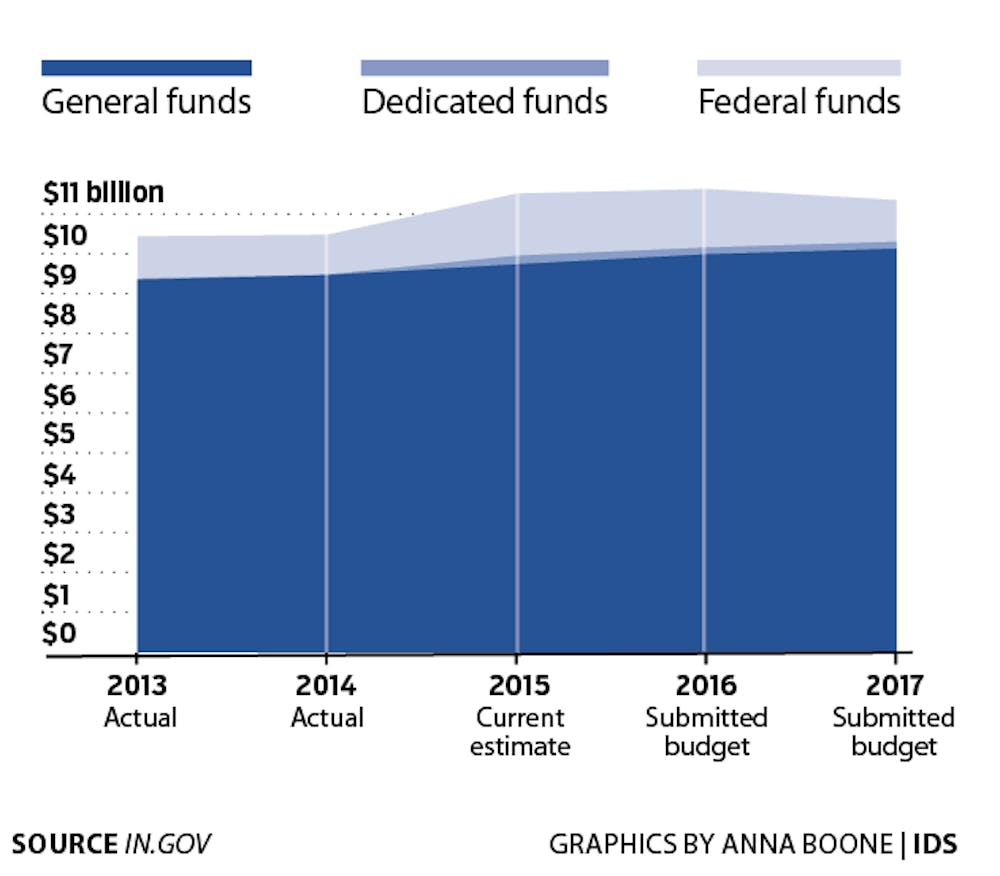Gov. Pence’s recommended budget for the next two fiscal years was announced before the State Budget Committee on Thursday.
Pence’s budget lists a number of commitments and priorities, namely to see that the budget remains honestly balanced, holds the line on spending, maintains reserves, funds our priorities and incurs no new debt.
The budget places an emphasis on supporting education by increasing funding for grades K-12 by 2 percent, or $134 million, in fiscal year 2016 and 1 percent, or $67 million, for fiscal year 2017.
“This is an education budget,” Pence said in a press release. “It puts Hoosiers first, continues Indiana on a pathway to prosperity and funds our priority of expanding educational opportunities for all our kids, from pre-K and K-12 to higher education and into the adult workforce.”
Some of the other initiatives that the budget details for education includes adding 10 percent more funding for Teacher Performance Grants each year, for a total of $63 million dollars by the end of fiscal year 2017.
The recommended budget also provides $10 million each year for the new pre-K pilot program, which awards grants to 4-year-olds from low-income families intending to attend preschool.
One more component of the recommended budget is the increase of $7 million in each of the next two years for adult high schools and another $5 million each year to fund Turnaround Support Initiatives to help failing school districts.
Funding for higher education is also a big focus of Pence’s recommended budget.
“We have committed ourselves to funding our priorities, beginning with excellence in education and increasing educational opportunities for all students from pre-K through higher education,” Pence said in the budget summary.
The recommended budget suggests an increase in funding for student financial aid by $27 million in fiscal year 2016 and another $12.7 million in fiscal year 2017.
In addition, unspent and unneeded Medicaid funds will be moved to and utilized by the Commission for Higher Education, which coordinates Indiana’s postsecondary education system.
Indiana follows a biennial budgetary system, which means that a budget is reassessed and passed every two years for the following two fiscal years.
The process of writing and passing a budget is long and detailed for the state and starts with the State Budget Agency, an agency that serves as an analyst, officer and adviser to the governor about the state budget.
Currently, the Budget Committee, a component of the State Budget Agency, is holding public hearings with many state agencies in order to estimate and compile enough budget information to write the budget bill.
After enough budget information is collected, the Budget Committee, a bipartisan committee that has two senators and two representatives from the Indiana General Assembly, along with a budget director, writes up the bill with the biennial budget that will need to be passed, first by the House of Representatives and then by the Senate.
The Indiana Budget Committee has two Republican members, Sen. Luke Kenley from Noblesville, Ind., and Rep. Tim Brown from Crawfordsville, Ind., and two Democrats, Sen. Karen Tallian from Portage, Ind., and Rep. Terry Goodin from Austin, Ind. Brian E. Bailey is the budget director of the committee.
The budget that is currently being made will be effective July 1, 2015 through June 30, 2017.





